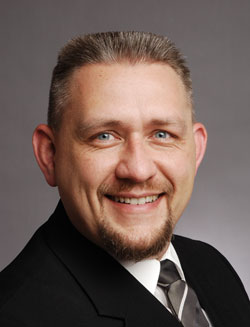Lower Saxony Strives for Life-Sciences Supremacy
 The regional health economy initiative BioRegioN is the central contact point for the life-sciences industry in Lower Saxony, Germany. It links partners from business, science and politics with the goals of transferring the high potential of excellent research findings into early commercialisation as well as sustainably strengthening Lower Saxony as a hub for the life sciences. The BioRegioN initiative connects, advises and supports companies, universities, research institutes and many other players in the areas of health economy, biotechnology and biomedical engineering in Lower Saxony. The research environment is very developed in the region, which is already home to several highly innovative life-sciences companies, some of them brand leaders. In the following interview, Gerrit Hohenhoff, Head of Office at BioRegioN, explains the history and development of the initiative:
The regional health economy initiative BioRegioN is the central contact point for the life-sciences industry in Lower Saxony, Germany. It links partners from business, science and politics with the goals of transferring the high potential of excellent research findings into early commercialisation as well as sustainably strengthening Lower Saxony as a hub for the life sciences. The BioRegioN initiative connects, advises and supports companies, universities, research institutes and many other players in the areas of health economy, biotechnology and biomedical engineering in Lower Saxony. The research environment is very developed in the region, which is already home to several highly innovative life-sciences companies, some of them brand leaders. In the following interview, Gerrit Hohenhoff, Head of Office at BioRegioN, explains the history and development of the initiative:
How did the Lower Saxony regional health economy initiative BioRegioN begin?
The BioRegioN arose in 1996 from the BioRegio competition of the Federal Ministry of Education and Research to be the central contact point for Life Sciences in Lower Saxony. In 2000, the state of Lower Saxony started the funding for the BioRegioN as a regional state initiative.
What are its goals?
The overall aim of BioRegioN is the sustainable protection and strengthening of Lower Saxony’s life-science businesses as well as of the region itself as an innovative and competitive international location. To reach these goals, there are four central tasks: strengthening of the network structures in the respective industries, sustainable securing and expansion of the competitive position of companies, mobilization of existing innovations and opening of new innovation potentials as well as accomplishing an increased market and a stronger application orientation of scientific research.
How is the initiative delivered?
There is a regular call for operating companies from Lower Saxony’s Ministry for Economy, Labour and Transport to run the BioRegioN office. Since January 2010, the Center for Biomedical Technology and Innovation (BiomeTI e.V.) is the operator of the BioRegioN.
What is BiomeTI e. V.?
BiomeTI e. V. is an initiative of Hannover-based university professors, all engaged in collaborative research in the field of biomedical engineering. It holds an exemplary spectrum of scientific expertise and clinical application experience in all relevant disciplines for biomedical engineering and health economy. BiomeTI e.V. has a long-standing tradition of interdisciplinary cooperation, and it aims – in conjunction with structural development funds, industrial companies and financiers and supported by the Lower Saxony state government – to foster research in biomedical technology in Hannover. In recent years, BiomeTI e.V. has been concentrating more and more on the co-ordination of research activities and research-driven clusters in life science and health related business on a regional level. Furthermore BiomeTi e.V. is involved in two European projects dealing with economical aspects of life science business.
 What agencies are participating in the initiative?
What agencies are participating in the initiative?
Lower Saxony’s Ministry for Economy, Labour and Transport assigned BiomeTI e.V. to operate the BioRegioN office to support all life science SMEs in Lower Saxony. Of course, there are a lot of contacts to other agencies like hannoverimpuls, NGlobal, NBank, IHK and other organisations to cooperate with in several activities. Furthermore, there are three regional contact centers in Lower Saxony involved in the BioRegioN. The Jade Innovation Center is the contact center in the north of Lower Saxony. It is operated by Biosphere AG and particularly offers start-ups and young companies the ideal opportunities to forge links between science and business. The two contact centers south of Hannover are the Braunschweig Informatics and Technology Center (BITZ) GmbH and the MBM Science Bridge. The BITZ’s primary objective is to carry out research projects in biology, biotechnology health research and other sectors and to support these with software technology development. The MBM Science Bridge is the technology transfer institution of the Georg August University of Göttingen and the patent utilisation agency in the context of the "cooperation network of Lower Saxony’s universities and research institutions".
What benefits does BioRegioN offer to companies, research institutions and universities?
As well as public relations and location marketing, the BioRegioN’s activities also focus on supporting and advising regional companies, universities and research institutions from the fields of health economy, biotechnology and biomedical technology. It also provides up-to-date industry information on trends and developments in the life science sector, as well as on funding and cooperation opportunities for network partners. The BioRegioN also initiates innovative research and development projects at EU, federal and state level.
Can you give me an example of a successful project operating under BioRegioN?
One excellent example for a successful project is IN2LifeSciences: Transnational INovation INcentives for Life Sciences SMEs. IN2LifeSciences is keen to assist SMEs in their quest to increase the transfer of research to the market in the fields of Life Sciences and medical technology. It aims to do this by promoting application-orientated, transnational collaboration agreements between SMEs and organisations that will support the SMEs in the research, development and commercialisation of new products. The aim of these cross-border cooperation agreements is to avoid and overcome innovation bottlenecks for SMEs. The overall aim is to improve competitiveness and the employment situation and strengthen the regional development of the life sciences.
What competitive advantages in the field of biotechnology does the Lower Saxony region offer?
Lower Saxony provides excellent research in all kinds of Life Sciences. Several small- and medium-sized enterprises are located in Lower Saxony as well. We don’t have a lot of big pharma or biotech companies but a lot of excellent smaller companies. It’s just a question of time before Lower Saxony becomes an important location for life-science business.
How do you see the future development of biotechnology and biomedical engineering?
The focus of biotechnology in the future will be in the areas of biomedical engineering and bio-economy. New implants are increasingly functionalised by biochemical processes or drug-eluting systems on the surface to make them fit better into the body. Other important fields are infection research and tissue engineering. In these fields, the development of appropriate active substances and the appropriate connections play a crucial role. The bio-economy will also play a significant role in the coming years. This depends on one hand on the considerable potential and the enormous width of this field, and on the other hand on the fact that sustainably significant funding schemes will be released for bio-economy.
Is there much resistance to the idea of biotechnology in Germany?
It depends on the particular field of biotechnology. There are still constrictions e.g. for stem cell research regarding the stem cell sources. In Germany, you can only use embryonic stem cells produced before May 2007. Nevertheless, Germany is participating at the cutting edge of stem-cell research work and publication. In the field of genetic manipulation, there are still a lot of discussions in Germany about what kind of manipulation is ethically correct and what is necessary. All in all, there is more support than resistance for biotechnology in Germany.


